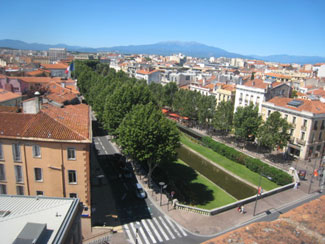Finding My "Yellow Brick Road"

It was only our first week studying here in Perpignan. The other journalism students and I were returning from an outing that was located in an area we had not yet explored. As I vaguely recognized landmarks from our walk over, Florence Delseny-Sobra, the founder of our French school, ALFMED, pointed out various neighborhoods that she suggested we avoid. As I made a mental note of these areas, I attempted to maintain a cool exterior, yet I could feel my stress level rapidly increasing. The possibility of getting lost in one of the more dangerous parts of Perpignan was terrifying to me. As the panic resonated in my mind, things suddenly took a turn for the worse. Delseny-Sobra announced she was taking us on a detour. I immediately tensed up – I've always been uncomfortable with directions, and I feared I would never truly feel at ease navigating my way through a foreign city.
Despite growing up in a small neighborhood outside of Toronto, I have spent the last five years of my life calling Ottawa home. Leaving behind my familiar childhood town to move five hours away was certainly a daunting task. Yet with its majestic buildings, deep historical roots and impressive scenery, Canada's capital city managed to appeal to me in an unpredictable number of ways, particularly in the form of the Rideau Canal.
The picturesque man-made waterway stretches across Ottawa, and has repeatedly (and reliably) served as my compass throughout my adventures in the nation's capital. Unable to depend on my poor sense of direction, I instead developed a habit of relying on the Rideau Canal to find my way home.
So when I found out I would be traveling to Europe for the first time it didn't take long for my urgent sense of directional distress to kick in. Upon arriving in France, I quickly became occupied with grasping the language, understanding the locals and adjusting to the leisurely laissez-faire attitude of Perpignan. Still, I couldn't shake my apprehensions of getting completely lost in this unfamiliar country.
But amid the confusion of trying to acclimate, I unexpectedly found myself a little taste of home, here in Southern France, during Delseny-Sobra's detour. As it turned out, she was showing us a sure-fire way to make it back to Alfmed – following the local waterway. Much like my trustworthy Rideau Canal, La Basse connects the city to the river, La Têt (flowing from the Pyrenees Mountains) and runs right through the centre of Perpignan. But best of all, according to Delseny-Sobra, "If you follow the water, you will always find your way home."
Looks like I might be all right here after all.
Recent Posts
The Cloth of the Sun by Su Kim
The Sculptor and his Wife by Mary Barczak
The Language Barrier by Jim Cameron
The Sixth Sense: Understanding by Christina Cocca
Bastille Day Bees by Annie Petersen
Reaching New Heights by Sarah Raghubir
Vive Perpignan by Chelsea Boone
The Changing Collioure Art Scene by Ariana Bacle
Having a Boule with Pétanque by Kristin O'Brien
Corridas in the 21st Century by Victoria King
Controversy Fermenting? by Marika Washchyshyn
A Different Culinary Landscape by Simon Arseneau
Student Pages
Simon Arseneau
Ariana Bacle
Mary Barczak
Chelsea Boone
Jim Cameron
Christina Cocca
Justine Dhollande
Su Kim
Victoria King
Kristin O'Brien
Annie Petersen
Sarah Raghubir
Alexis Sanchez
Maegan Simmons
Marika Washchyshyn
About the Program
Fifteen college students came from North America to Perpignan, France, in June 2011 to produce these videos and stories. To find out more, read a welcome letter from program director Rachele Kanigel, meet the program faculty and explore the 2010 website.

